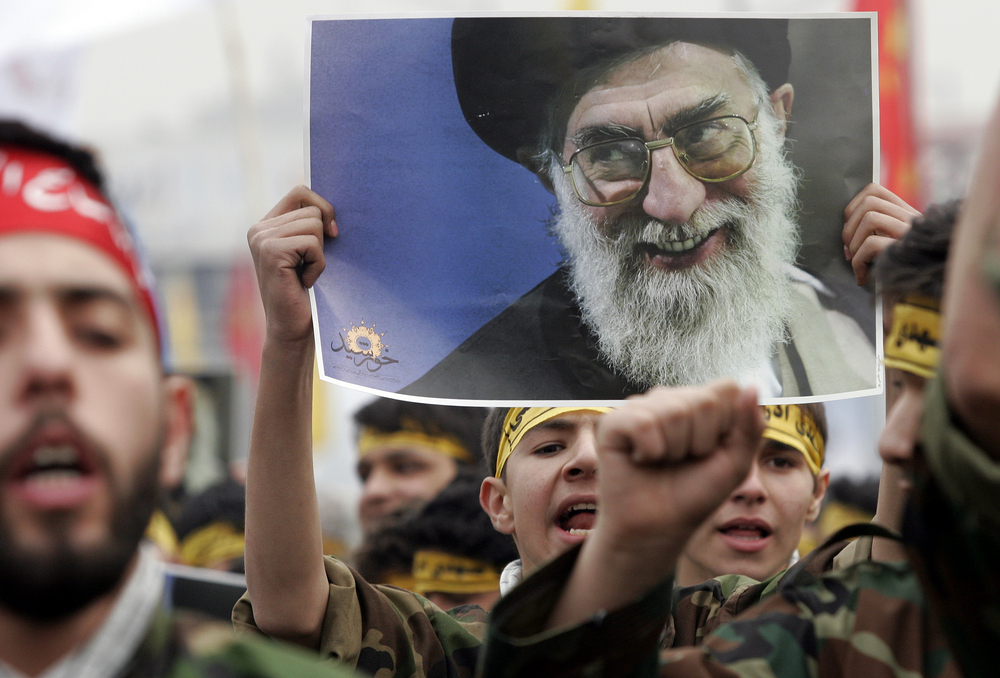Strangulation Of Persia: Why Trump’s Iran Policy Will Backfire
 Protestors holding photo of Ayatollah Khamenei (serkan senturk via Shutterstock)
Protestors holding photo of Ayatollah Khamenei (serkan senturk via Shutterstock)
by Sina Azodi
Over the past four decades, U.S.-Iranian relations have experienced frequent periods of hostility. The Trump administration, however, has escalated tensions, going as far as threatening Iran with war. The administration is under the false impression that by strangling Iran’s economy through sanctions and applying a “maximum pressure policy” it can force Iran to capitulate to its demands or face the possibility of its collapse. This is either a dangerous misjudgment or a calculated decision to go to war with Iran that will have devastating ramifications for regional stability and U.S. interests.
Prior to the attack on Pearl Harbor, the Japanese ambassador to the United States warnedthat “Japan is being placed under severe pressure by the United States to yield to the American position…..it is preferable to fight rather than to yield to pressure.” Imperial Japan concluded that, under severe U.S. economic pressure, only military action could alter the situation. Although Japan was eventually forced to sign an unconditional surrender, once the survival of a state is at stake, the perceived military and political benefits of an attack could outweigh a suffocating demise.
While the Trump administration works to cut Iran’s oil exports to zero, Iranian officials have repeatedly warned that, if Iran cannot export its oil, they will halt other countries’ oil shipments from the Persian Gulf. Surely, any attempts by Iran to close the Strait of Hormuz will provoke a U.S. military response. Recently, General Hossein Alayi, a former commander of the Islamic Revolutionary Guard Corps (IRGC) noted that “if Iran can shut down the strait of Hormuz, America can reopen it…. Iran must analyze the costs and benefits of such an action.” Under extreme pressure, Iranians may conclude that the “political and military” benefits of closing the Strait of Hormuz outweigh the costs and act upon their threats. The ensuing war will be disastrous for everyone, including the United States.
It may seem “irrational” for Iran to provoke a direct confrontation with the United States. However, Iran’s cost-benefit analysis is unique in the sense that, under foreign pressure, it will not act on the basis of what Western observers call “rationality.” Iran is an ancient civilization with deep roots in Persian nationalism and Shia teachings, both of which denounce capitulation and honor sacrifice in the face of oppression. In the Iran-Iraq War (1980-1988), the strategically isolated Iran fought eight years to repel the internationally backed Saddam Hussein. Iranians retain a bitter memory of this lopsided conflict.
Newly declassified documents released by the National Security Archive reveal that America’s allies in both Europe and in the Persian Gulf have previously warned the United States of the dangers of attempting to isolate Iran or pursue a regime collapse. In a cable from the U.S. embassy in Abu Dhabi to Washington, an Emirati official wrote that “If Iran were pushed over the brink … the aftermath could pose risks for the entire region,” and if seriously threatened “it might try to retaliate.” He further cautions against attempts at precipitating regime collapse by suggesting that the “ensuing instability will create serious problems for the region.”
The Trump administration’s current maximum-pressure policy to force Iran to capitulate to its long list of demands also affects Iran’s domestic politics in ways that undermine American interests in the long term. First, as the United States tightens the noose around Iran’s mismanaged economy, competing factions of Iran’s political establishment are converging to address the external pressure. Recently, Iranian President Hassan Rouhani called on different political factions to “unite against [US] economic and political pressure.” Meanwhile, Supreme Leader Ayatollah Khamenei recently urged state institutions to support President Rouhani’s fight against U.S. pressure.
Second, the current U.S. strategy will simultaneously undermine the position of pro-engagement factions and set the stage for the return of Iranian hardliners who oppose any engagement with the West, especially the United States. Another State Department cable quotes former French President Jacques Chirac’s warning that “It would be very dangerous to isolate Iran totally…. experience proves that the U.S. embargo benefits only the extremists.”
The rise of Mahmoud Ahmadinejad to power in 2005 was the product of another pressure policy on Iran. When Iran’s reformist President Mohammad Khatami initiated a détentewith the United States, the Bush administration not only dismissed Iran’s overtures but put Iran on the Axis of Evil list. “Some people at the White House rewarded Iranians with a President that went on for eight years. He gave me an early retirement. Now I am back from the dead,” Iran’s Foreign Minister Javad Zarif noted in 2014.
The Trump administration may not care about the rise of hardliners in Iran or, worse, welcomes the development as a pretext for war. President Trump’s national security team is comprised of well-known Iran hawks, such as National Security Advisor John Bolton, who not only dismiss any negotiations with America’s enemies but see war with Iran as a desirable outcome. U.S.-Iranian relations are already on a worrisome trajectory; war is not unimaginable. The rise of hardliners in Iran could escalate tensions even further, making the outbreak of a conflict even more likely.
The Trump administration’s approach to Iran is a dangerous shift from the long practiced “carrots and sticks” to a “no carrots and only sticks” approach. For a nationalistic country like Iran, which over the course of its long history has never bowed down to its adversaries, it is simply inconceivable to negotiate under circumstances that resemble a humiliating capitulation to a bullying adversary.
Sina Azodi is a PhD student in political science and a graduate researcher at University of South Florida’s Center for Strategic and Diplomatic Studies. He received his BA & MA from Elliott School of International Affairs, George Washington University. Follow him on Twitter @azodiac83
https://lobelog.com/strangulation-of-persia-why-trumps-iran-policy-will-backfire/

0 Comments:
Post a Comment
Subscribe to Post Comments [Atom]
<< Home